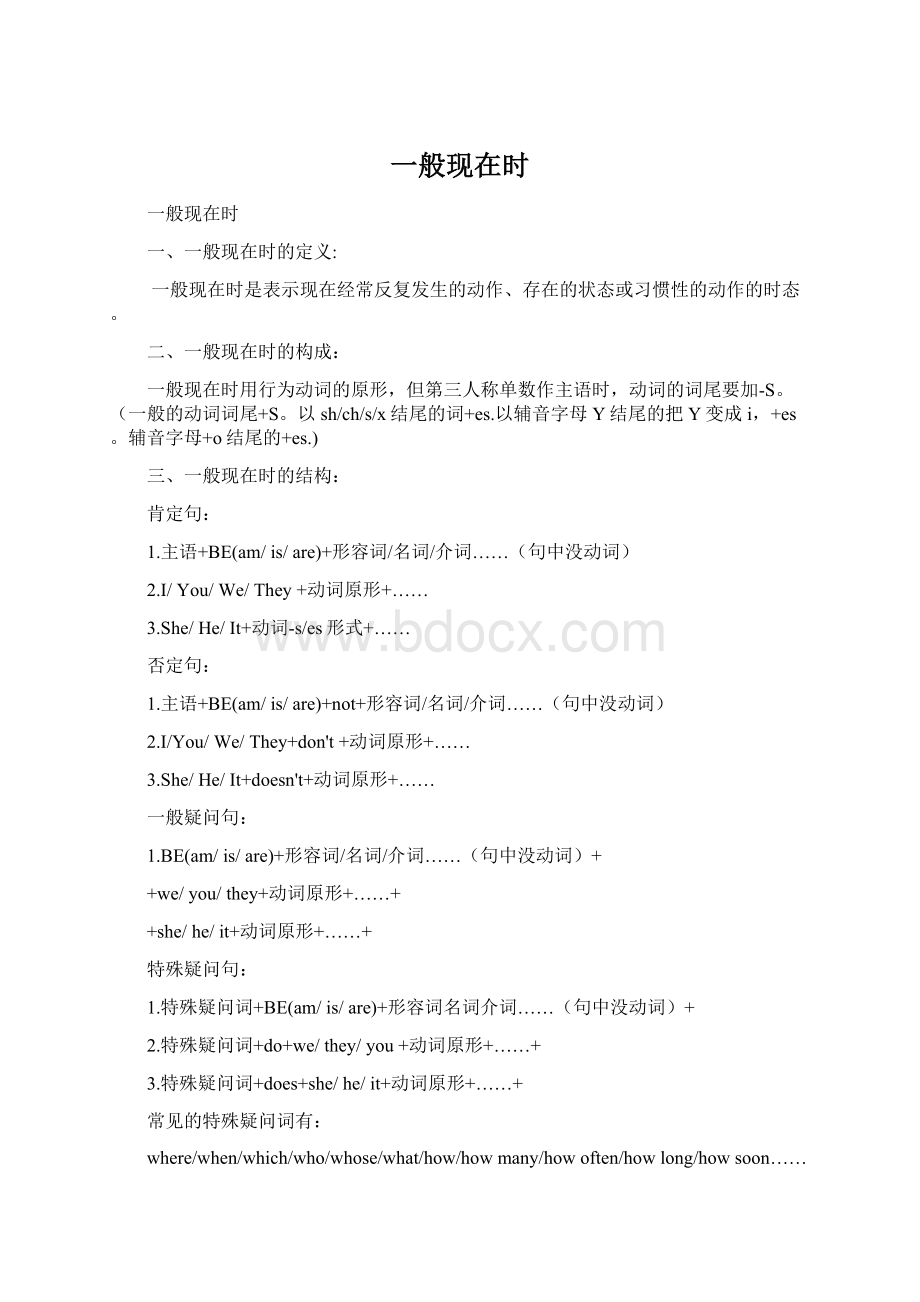一般现在时.docx
《一般现在时.docx》由会员分享,可在线阅读,更多相关《一般现在时.docx(7页珍藏版)》请在冰豆网上搜索。

一般现在时
一般现在时
一、一般现在时的定义:
一般现在时是表示现在经常反复发生的动作、存在的状态或习惯性的动作的时态。
二、一般现在时的构成:
一般现在时用行为动词的原形,但第三人称单数作主语时,动词的词尾要加-S。
(一般的动词词尾+S。
以sh/ch/s/x结尾的词+es.以辅音字母Y结尾的把Y变成i,+es。
辅音字母+o结尾的+es.)
三、一般现在时的结构:
肯定句:
1.主语+BE(am/is/are)+形容词/名词/介词……(句中没动词)
2.I/You/We/They+动词原形+……
3.She/He/It+动词-s/es形式+……
否定句:
1.主语+BE(am/is/are)+not+形容词/名词/介词……(句中没动词)
2.I/You/We/They+don't+动词原形+……
3.She/He/It+doesn't+动词原形+……
一般疑问句:
1.BE(am/is/are)+形容词/名词/介词……(句中没动词)+
+we/you/they+动词原形+……+
+she/he/it+动词原形+……+
特殊疑问句:
1.特殊疑问词+BE(am/is/are)+形容词名词介词……(句中没动词)+
2.特殊疑问词+do+we/they/you+动词原形+……+
3.特殊疑问词+does+she/he/it+动词原形+……+
常见的特殊疑问词有:
where/when/which/who/whose/what/how/howmany/howoften/howlong/howsoon……
四、一般现在时的用法:
1)经常性或习惯性的动作,常与频度副词或与表示频度的时间状语连用。
(注:
频度副词常位于主动词之前,如果主动词是BE则常位于其后,也可为了强调而位于其前。
)
常见的频度副词和时间状语有:
always,usually,regularly,often,sometimes,occasionally,rarely,ever,never,frequently,seldom,hardlyever=(almostnever),fromtimetotime,
everymorning/afternoon/night/evening/day/week/year,twiceaweek,
onceamonth/week,inthemorning/afternoon/evening.......
如:
Ileavehomeforschoolat7everymorning.
MymotherusuallywatchesTVatnight.
Lilyalwaysgoestoschoolbybus.
Tomoftengoestohisofficebyunderground.
Fatherdoesn'tsmoke.
Werarelygohikingwhenitrains.
Hehardlyevermakesamistakewhenhewrites.
Sheissometimesalittleangrywithhim.
Thestudentsarealwaysontimeforclass.
2)客观真理,客观存在,科学事实。
如:
Theearthmovesaroundthesun.地球围着太阳转。
ShanghailiesintheeastofChina.上海位于中国的东部。
LondonstandsontheRiverThames.伦敦位于泰晤士河旁边。
3)表示格言或警句中。
Pridegoesbeforeafall.骄兵必败。
☆注意:
第二、第三种用法如果出现在宾语从句中,即使主句是过去时,从句谓语也要用一般现在时。
(初中才接触到此用法)
如:
Columbusprovedthattheearthisround.哥伦布证明了地球是圆的。
4)现在时刻的状态、能力、性格、个性。
如:
Idon'twantsomuch.(状态)
AnnWangwritesgoodEnglishbutdoesnotspeakwell.(能力)
5)以here,there等开始的倒装句,表示动作正在进行。
如:
Herecomesthebus.=Thebusiscoming.车来了。
Theregoesthebell.=Thebellisringing.铃响了。
6)在下列情况下表示将来:
A.在状语从句中用一般现在时代替一般将来时。
如:
IwillgiveittohimassoonasIseehim.
我一看见他就交给他。
Hewillcomeifyouinvitehim.
如果你请他,他会来的。
Supposehedoesn’tagree,whatshallwedo
假如他不同意,那怎么办
Hewillcontinuetheworknomatterwhathappens.
不管发生什么情况他都要继续这项工作。
Willyougoandhelptogetinthecropswhentheharvesttimecomes
当农忙季节到来时,你会来帮忙收割庄稼吗
Ifitisfinetomorrow,wewillgotothecountryside.
如果明天天气好的话,我们将会到乡村去。
B.在themore…themore…(越……越……)句型中,前者通常用一般现在时代替一般将来时,因为前者相当于条件状语从句。
如:
Theharderyoustudy,thebetterresultsyouwillget.
你学习越努力,成绩就会越好。
C.在makesure(certain),see(toit),mind,care,matter后的宾语从句的谓语动词用一般现在时代替一般将来时。
如:
Seetoitthatyouarenotlateagain.注意别再迟到了(from)。
I'llsee(toit)/makesure/makecertain(that)youdon'tgetlost.
D.表示按计划或时间表将要发生的动作,通常有表示将来的时间状语。
如:
Theplanetakesoffat11:
30andarrivesinShanghaiatl:
20.
飞机十一点半起飞,一点二十分抵达上海。
(注:
只限于少数动词能这样用,如:
begin,start,takeoff,end,finish,stop,go,come,leave,sail,arrive,return,close,open等。
)
E.在Ihope,Ibet等后面的that-分句中可用一般现在时表示将来时间。
如:
Ihopeyouhaveagoodtime.
Ihopeshelikestheflowers.
Ibetitrainstomorrow.
7)表示过去时间:
能用一般现在时表示过去时间的动词有tell,say,hear,learn,gather等。
如:
Alicetellsmeyou'reenteringcollegenextyear.
IhearpooroldMrsSmithhaslostherson.
五、一般现在时中谓语动词的变化规则:
1)当主语是第一、二人称,或者第三人称复数时,谓语动词用原形:
如:
Ilikeplayingchess.
Youlookbeautifultoday.
Theygotoschoolbybuseveryday.
2)当主语是第三人称单数(he/she/it/单数)时,谓语动词变化规则如下:
A.直接加-s。
如:
come---comes,begin---begins,play---plays,work---works.
B.以字母s、x、o、sh、ch结尾的动词加-es。
如:
guess-guesses,fix---fixes,watch---watches,wash--washes,do---does,go---goes.
C.以辅音字母加y结尾的动词,先把y变成i,再加-es。
如:
fly---flies,study---studies,try---tries.
D.be动词在一般现在时中有三种形式:
(I)am;(he/she/it/单数)is;(we/you/they/复数)are.
E.动词have的第三人称单数为has。
一般现在时的练习
一、用所给动词的适当形式填空:
1.Weoften______(play)intheplayground.
2.He_____(get)upatsixo’clock.
3._____you______(brush)yourteetheverymorning.
4.What(do)______heusually(do)______afterschool
5.Tom_____(study)English,Chinese,Maths,ScienceandArtanschool.
6.Mikesometimes________(go)totheparkwithhissister.
7.Ateightatnight,she__________(watch)TVwithhisparents.
8.________Mike________(read)Englisheveryday
9.Howmanylessons_________yourclassmate________(have)onMonday
10.Whattime_________hismother_________(do)thehousework
likecollectingChinesestamps.Iusually(collect)stamps.
(go)toschoolfromMondaytoFriday.
parents(like)reading(read)sciencemagazines.
usually(watch)TVafterschool,helikes(like)(watch)TV.
(want)to(go)tothepark.
usuallygo(swim)afterschool.
二、按要求改句子:
1.Doyouoftenplayfootballafterschool(肯定回答)
2.Ihavemanybooks.(改为否定句)
3.GaoShan’ssisterlikesplayingtabletennis(改为否定句)
4.ShelivesinasmalltownnearNew